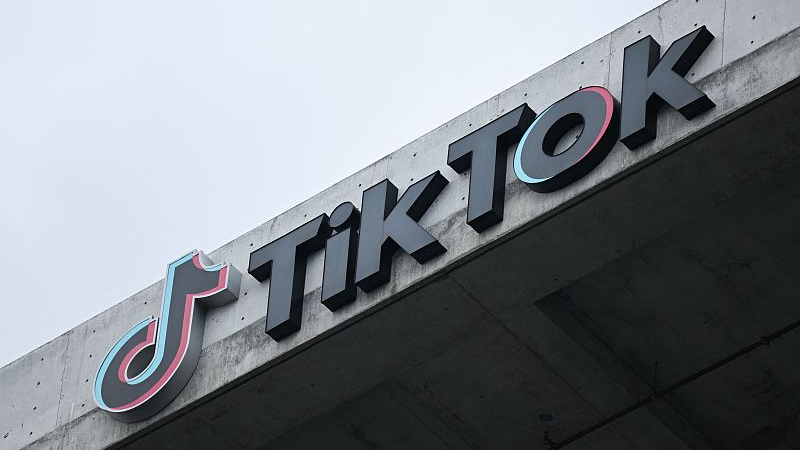
TikTok logo displayed on signage outside TikTok's social media app company office in Culver City, California, March 16, 2023. /CFP
TikTok logo displayed on signage outside TikTok's social media app company office in Culver City, California, March 16, 2023. /CFP
Editor's note: Radhika Desai is a professor of political studies at the University of Manitoba in Canada. The article reflects the author's opinions and not necessarily the views of CGTN.
U.S. lawmakers have been discussing a ban on TikTok for some years now, and imposing on owner Bytedance a forced sale (inevitably at an unfavorable price) has been a prominent option. Even as Congress appeared indecisive on the matter after grilling CEO Shou Zi Chew last month, Governor Greg Gianforte made Montana the first U.S. state to ban it by signing a law that prohibits TikTok and any app store from providing the service in the state.
Thus opened a new chapter in the saga of the popular short-video social media platform launched in the U.S. in 2017 and its fourth most popular social media platform today, particularly among the young. Last year, it was also the most downloaded app in the U.S.
The saga has revolved around unfounded allegations that the platform constitutes a security threat to the U.S. by giving the Chinese government access to the data of its 150 million users and that the Chinese government uses it to interfere in U.S. elections. State officials in many jurisdictions, including many U.S. states, have already been banned from using TikTok, though there was no ban on personal use until the Montana legislation.
The allegations are far from being conclusively proven and remain controversial. Moreover, TikTok has moved all its U.S. traffic to servers owned by the U.S. tech company Oracle. Furthermore, TikTok intentionally refrains from accepting political advertising to maintain a significant distance from U.S. politics.
These allegations are not only shockingly baseless, they are remarkably hypocritical. The U.S.' sprawling networks of surveillance target not just security threats but prominent office holders such as Angela Merkel in states it calls its allies. Moreover, it does all this with the cooperation of supposedly private and autonomous internet firms, including Facebook, Google, Microsoft, and Yahoo as Edward Snowden's revelations of the Prism program exposed. As for political interference, the U.S.' long and dishonorable record goes back to the days of the Monroe Doctrine, through its role in suppressing the left all over the world including Europe and Japan after World War II, to its color revolution and regime change operations today.

People dance and record themselves with a mobile phone for a TikTok video in front of the Brooklyn Bridge in New York City, May 26, 2020. /CFP
People dance and record themselves with a mobile phone for a TikTok video in front of the Brooklyn Bridge in New York City, May 26, 2020. /CFP
Of course, such hypocritical and evidence-free action has long been the hallmark of the U.S. state and the TikTok saga is unlikely to end anytime soon. For one thing, the bulk of the U.S. tech sector, Silicon Valley is very threatened by China's tech sector. Having long sought to preserve its dominance by zero-sum policies such as enforcing intellectual property rights rather than the positive-sum strategy of continuous innovation, it is today leading the charge against China's booming and radically innovative tech sector and its most important companies, such as Huawei or TikTok.
Secondly, China has emerged as the chief ruse U.S. politicians of both parties use when they seek to draw attention away from the bipartisan failures in economic policy that have brought the U.S. to its present economic mess of low wages, rising inequality, financialization, low investment and yes, declining innovation. Rather than talk about how to address these, and how to correct course on economic policy, it is so much easier to finger China. After all, serious course correction would mean having to reverse the very policies that favor the small corporate elite that really runs the U.S.
Finally, the U.S. continues to target China and its successful companies today because of the fond illusion it had set about making nice to China in the 1990s – that China would remain an obliging producer of cheap, low-technology, goods with cheap labor – have been dispelled over the last decade and more and the only reaction U.S. law and policy-makers can muster is of incoherent rage.
So, the TikTok saga will continue. Today, even those arguing against a ban on China tend to repeat the unfounded allegations about China hacking trade secrets, posing a security threat and meddling in U.S. elections, so the animus that drives the campaign against TikTok remains powerful. And the saga's further unfolding will not be without complications. For one thing, it is next to impossible to enforce: it can be circumvented by VPNs while most platforms cannot monitor state-level use, so they have no means of preventing residents of a single state from using their services.
And there will be legal challenges too. Its constitutionality will be challenged on the grounds of free speech and because the law is a "bill of attainder," a law that punishes somebody without due process. After all, TikTok's 150 million users have a great interest in challenging the law and these users do not just include young people using the app for entertainment but a whole lot of businesses for whom the app has become the chief platform for winning customers and clients.
(If you want to contribute and have specific expertise, please contact us at opinions@cgtn.com. Follow @thouse_opinions on Twitter to discover the latest commentaries in the CGTN Opinion Section.)